Other answers here to not take into consideration if you have all-zero's (or even a single zero).
Some always default an empty string to zero, which is wrong when it is supposed to remain blank.
Re-read the original question. This answers what the Questioner wants.
Solution #1:
--This example uses both Leading and Trailing zero's.
--Avoid losing those Trailing zero's and converting embedded spaces into more zeros.
--I added a non-whitespace character ("_") to retain trailing zero's after calling Replace().
--Simply remove the RTrim() function call if you want to preserve trailing spaces.
--If you treat zero's and empty-strings as the same thing for your application,
-- then you may skip the Case-Statement entirely and just use CN.CleanNumber .
DECLARE @WackadooNumber VarChar(50) = ' 0 0123ABC D0 '--'000'--
SELECT WN.WackadooNumber, CN.CleanNumber,
(CASE WHEN WN.WackadooNumber LIKE '%0%' AND CN.CleanNumber = '' THEN '0' ELSE CN.CleanNumber END)[AllowZero]
FROM (SELECT @WackadooNumber[WackadooNumber]) AS WN
OUTER APPLY (SELECT RTRIM(RIGHT(WN.WackadooNumber, LEN(LTRIM(REPLACE(WN.WackadooNumber + '_', '0', ' '))) - 1))[CleanNumber]) AS CN
--Result: "123ABC D0"
Solution #2 (with sample data):
SELECT O.Type, O.Value, Parsed.Value[WrongValue],
(CASE WHEN CHARINDEX('0', T.Value) > 0--If there's at least one zero.
AND LEN(Parsed.Value) = 0--And the trimmed length is zero.
THEN '0' ELSE Parsed.Value END)[FinalValue],
(CASE WHEN CHARINDEX('0', T.Value) > 0--If there's at least one zero.
AND LEN(Parsed.TrimmedValue) = 0--And the trimmed length is zero.
THEN '0' ELSE LTRIM(RTRIM(Parsed.TrimmedValue)) END)[FinalTrimmedValue]
FROM
(
VALUES ('Null', NULL), ('EmptyString', ''),
('Zero', '0'), ('Zero', '0000'), ('Zero', '000.000'),
('Spaces', ' 0 A B C '), ('Number', '000123'),
('AlphaNum', '000ABC123'), ('NoZero', 'NoZerosHere')
) AS O(Type, Value)--O is for Original.
CROSS APPLY
( --This Step is Optional. Use if you also want to remove leading spaces.
SELECT LTRIM(RTRIM(O.Value))[Value]
) AS T--T is for Trimmed.
CROSS APPLY
( --From @CadeRoux's Post.
SELECT SUBSTRING(O.Value, PATINDEX('%[^0]%', O.Value + '.'), LEN(O.Value))[Value],
SUBSTRING(T.Value, PATINDEX('%[^0]%', T.Value + '.'), LEN(T.Value))[TrimmedValue]
) AS Parsed
Results:

Summary:
You could use what I have above for a one-off removal of leading-zero's.
If you plan on reusing it a lot, then place it in an Inline-Table-Valued-Function (ITVF).
Your concerns about performance problems with UDF's is understandable.
However, this problem only applies to All-Scalar-Functions and Multi-Statement-Table-Functions.
Using ITVF's is perfectly fine.
I have the same problem with our 3rd-Party database.
With Alpha-Numeric fields many are entered in without the leading spaces, dang humans!
This makes joins impossible without cleaning up the missing leading-zeros.
Conclusion:
Instead of removing the leading-zeros, you may want to consider just padding your trimmed-values with leading-zeros when you do your joins.
Better yet, clean up your data in the table by adding leading zeros, then rebuilding your indexes.
I think this would be WAY faster and less complex.
SELECT RIGHT('0000000000' + LTRIM(RTRIM(NULLIF(' 0A10 ', ''))), 10)--0000000A10
SELECT RIGHT('0000000000' + LTRIM(RTRIM(NULLIF('', ''))), 10)--NULL --When Blank.
